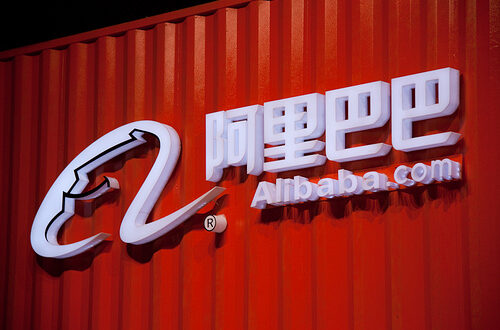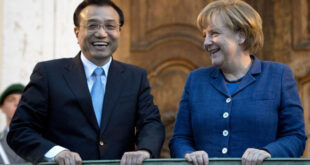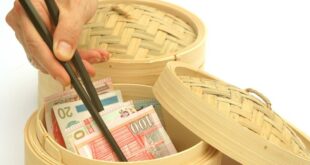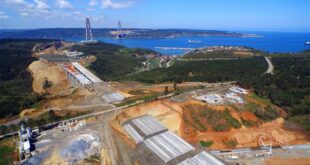The Alibaba Group offers up to $2.5 billion to take its Hong Kong-listed B2B trading platform private, four years after the company went public.
The market gave a thumbs up yesterday to Alibaba Group’s proposal to privatise its Hong Kong listed business-to-business (B2B) unit Alibaba.com a little more than four years after it went public. Or how else does one interpret the 42.7% jump in the share price when the stock resumed trading yesterday?
The share price didn’t quite match the offering price — it closed 2.2% below — but analysts say the fact that it got so close is a clear indication that investors believe the $2.5 billion deal will go through. In their joint statement issued Tuesday evening, Alibaba.com and its parent, both of which were founded by Chinese internet entrepreneur Jack Ma, said that they will not increase the offer price and under the Hong Kong listing rules that means they now won’t be permitted to do so.
The offer price, or cancellation price as it is referred to in the statement, represents a significant premium to the pre-announcement share price, but it is also equal to the price at which the company sold shares in its $1.7 billion initial public offering in October 2007. This isn’t expected to be a deterrent, however, as the share price has been under a lot of pressure in the past 12 months, partly because of a drop in demand from Alibaba.com’s two main markets in the US and Europe — the company is the leading online market place for connecting Chinese manufacturers, especially small and medium-sized businesses, with international importers. But the company has also shifted its focus from aggressively seeking paying members (basically Chinese suppliers) for its e-commerce platform to providing a higher quality service to non-paying buyers. The intention is to increase the activity level of buyers.
On a conference call with analysts on Tuesday evening after the announcement of the privatisation offer and Alibaba.com’s fourth quarter earnings (a transcription of which was published on Bloomberg yesterday) the CEO of the listed company, Jonathan Lu, said that the management believes the restructuring, which includes new business initiatives like AliExpress and 1688.com that have yet to contribute materially to revenues, will result in a long-term success for the company, but added that it will have a negative impact on its financial results in near- to medium-term.
“Because the company is right now undergoing a business restructuring, it could take two to three years before we see strong growth, and in that context it is an attractive offer,” said Elinor Leung, an analyst with CLSA. “The company is cashflow positive so you may argue that it deserves to trade at a higher valuation, but I don’t think it will be returning any of that cash any time soon.”
Another analyst agreed and said the chances that the share price would have gotten back to the IPO price any time soon were extremely slim. “If long-term investors break even on the deal, it will be a phenomenal transaction,” he said.
The parent company is offering to pay shareholders HK$13.50 per share in cash, which translates into a 45.9% premium versus the closing price on February 8 — the last day the stock traded before being suspended pending details of the offering. It also works out at a 55.3% premium to the average close in the 10 days just before the suspension and a 60.4% premium to the 60-day closing average. Before yesterday’s jump, the share price had fallen 40% in the past 12 months and the latest close of HK$9.25 was 31% below the IPO price. Yesterday the stock finished at HK$13.20.
According to Alibaba.com’s chief financial officer, Maggie Wu, the group took three key issues into account when determining the offer price: the historical trading price of the stock; the trading multiples of comparable internet companies; and the offer price on other privatisations of Hong Kong-listed companies in recent years.
With regard to the latter, she noted that the average premium on other privatisations in the past three years is about 25% to 27%, although she didn’t mentioned which period that premium referred to. Still, it suggests that the offer to Alibaba.com’s shareholders is at a significant premium whatever metric is used.
The offer price also translates into a price-to-earnings ratio of 33.2 times the company’s diluted earnings per share for the 2011 fiscal year, or 35.5 times the projected earnings for 2012, based on the average analyst forecasts compiled by Bloomberg.
The privatisation will be carried out through a scheme of arrangement, which means the proposal will need to be approved by shareholders owning at least 75% of the shares that are held by independent investors. Also, no more than 10% of these shares can be voted against the proposal, or it will fail. The company has yet to set a date for an extraordinary general meeting to vote on the issue.
At present, the Alibaba Group and other concerted parties, including management shareholders and some of the financial advisers to the transaction, hold 73.45% of Alibaba.com, although this will fall to 71.8% if all outstanding share options and share awards are exercised or vested before the record date — as is expected. The total portion of shares covered by the privatisation offer will account for up to 28.65%, which at the offering price translates into a total deal size of up to HK$19.63 billion ($2.5 billion).
Alibaba Group said it intends to finance the cash offer from a combination of internal cash resources and a $3 billion syndicated loan that was signed earlier this week with a consortium of six banks, namely ANZ, Credit Suisse, DBS Bank, Deutsche Bank, HSBC and Mizuho Corporate Bank.
Credit Suisse and Deutsche Bank are also acting as joint financial advisers to Alibaba Group on the privatisation together with Rothschild. HSBC is a financial adviser to Alibaba.com. The company’s independent board committee is being advised by Somerley.
The company said the privatisation will give it more flexibility to make strategic decisions that are focused on long-term benefits of the company without having to worry about the pressure of market expectations, earnings visibility and share price fluctuations. In the call with analysts, Wu also noted that the depressed share price in the past year has had an adverse impact on the company’s reputation with its customers and therefore on its business — and employee morale.
And from an investor perspective, she added, the proposal will also “provide key shareholders with an opportunity to realise their investment in Alibaba.com for cash, at an attractive premium, instead of having to assume a different risk profile brought about by the new business strategy.”
The stock is very thinly traded and it would have been difficult for investors to sell shares in meaningful sizes without affecting the share price. According to the privatisation announcement on Tuesday, the average daily trading volume in the past 24 months was only about 9.1 million shares per day, which translates into less than 0.2% of the issued share capital.
Analysts agreed with this rationale and also noted that if the company goes ahead with its plans to list the entire group in the future, it makes more sense to first assume complete control of the different parts of the business.
The company stressed that the privatisation has nothing to do with Jack Ma’s attempts to acquire Yahoo’s stake in Alibaba Group or even to make a bid for Yahoo itself, although it cannot hurt to have a cleaner group structure behind him when trying to put together a deal. Yahoo owns about 40% of Alibaba Group.
Alibaba.com reported a 15.5% increase in revenues in 2011 to Rmb6.4 billion ($1 billion), down from 43% growth in 2010. Net profit rose to Rmb1.7 billion from Rmb1.5 billion the previous year. Partly because of its shift in focus and an increase in membership fees in the fourth quarter, the number of paying members fell 5.4% last year to just under 765,400 after growing by 31.6% in 2010. However, the number of free registered users on its international platform grew 41.6% year-on-year to approximately 25.5 million and the number of store fronts increased to about 2.2 million from 1.7 million at the end of 2010
Wu told analysts that the company still has a cautious view both on the global economy and China’s domestic economy and continues to see challenges ahead. In light of that, and because of Alibaba.com’s own strategic focus, the membership growth on its online market places “may continue to show negative growth” this year.
Source: Finance Asia
 Asia Finance News Asia finance news, banking, market analysis, business, Forex, trade, Cryptocurrency as it is happening in Asia. Trusted gateway for Asian financial news.
Asia Finance News Asia finance news, banking, market analysis, business, Forex, trade, Cryptocurrency as it is happening in Asia. Trusted gateway for Asian financial news.





